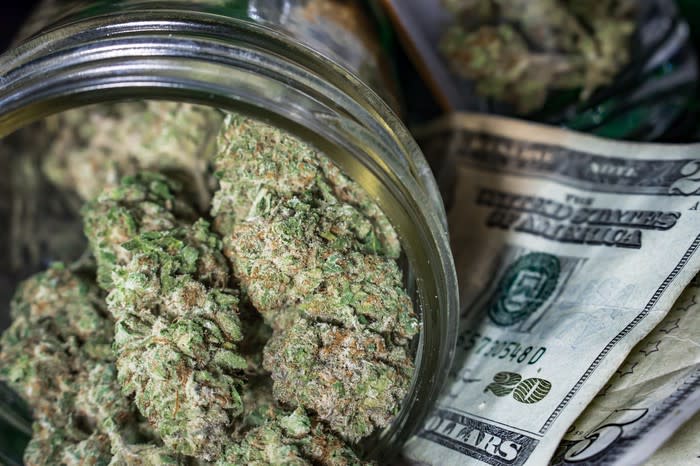Let's Face the Facts: Marijuana Stocks Grossly Overpaid for Their Acquisitions
Pardon the cliche, but the marijuana industry is expected to be the greatest thing since sliced bread. After legal worldwide sales nearly hit $11 billion in 2018, according to the duo of Arcview Market Research and BDS Analytics, they're on track to top $40 billion by 2024, with investment bank Stifel calling for as much as $200 billion per year in sales, globally, in a decade.
This is the type of growth that's tough for Wall Street and investors to ignore -- and it's even tougher for the companies operating in the legal cannabis industry to overlook.

Acquisition activity is picking up, and so is goodwill recognition
Since the beginning of 2018, it's been a veritable free-for-all on the expansion front throughout North America. We've witnessed Canadian pot growers buy other growers, while in the U.S., vertically integrated multistate dispensaries have been gobbling up other dispensary operators in order to expand their presence. Remember, even though Canada has legalized recreational weed, it's the U.S. that'll be the marijuana industry's crown jewel in terms of sales.
Though this acquisition activity is designed to allow cannabis stocks to quickly gobble up market share while it's still up for grabs, it could wind up backfiring on the industry, and investors.
You see, when one company buys another, it's not uncommon for the acquiring company to pay a premium to the business being acquired. This is the dangling carrot that's typically needed to gain shareholder and board approval for a deal. This "premium" that's above and beyond tangible assets is often classified as "goodwill" on the acquiring company's balance sheet.
Again, some amount of goodwill is expected when making an acquisition. But, in general, it's not a good thing to be lugging around on a balance sheet.
The goal, of course, is for the acquiring company to recoup all of the goodwill it paid by developing the assets acquired, as well as monetize any intellectual property. Unfortunately, this isn't always the case, and if goodwill from an acquisition cannot be recouped, it'll be written down by the acquiring company. This is, in effect, an admission that the acquirer overpaid for one or more assets, which winds up being recognized as a charge on its income statement.

The data doesn't lie: Cannabis stocks overpaid for their acquisitions
Even though we're still in the early innings of the cannabis industry's expansion, meaning there's time for acquiring companies to develop the assets they buy and recoup some or most of their goodwill, it's looking all the more likely that writedowns are coming.
Here's a brief rundown of the goodwill totals (Canadian dollars represented with "CA$") some cannabis stocks are lugging around on their balance sheets:
Aurora Cannabis (NYSE: ACB): CA$3.18 billion
Canopy Growth (NYSE: CGC): CA$1.93 billion
Aphria (NYSE: APHA): CA$669.8 million
iAnthus Capital Holdings (OTC: ITHUF): CA$555.4 million
Tilray (NASDAQ: TLRY): $155 million
Aurora Cannabis, the most popular marijuana stock among millennials, has more than half of its total assets tied up in goodwill. Though it's recognized goodwill from a number of its more than one dozen acquisitions over the past three years, most of it (CA$2 billion) was derived from Aurora's purchase of Ontario-based MedReleaf for CA$2.64 billion in July 2018. It's unclear at this point if Aurora will be able to recoup such a huge amount of goodwill.
Canopy Growth, which recently reported its fiscal first-quarter operating results, saw goodwill rise CA$387 million from the sequential quarter to CA$1.93 billion, or 22% of total assets. Unlike Aurora, which has one transaction that accounts for a large percentage of its goodwill, Canopy Growth's goodwill looks to be from a steady stream of deals in the CA$100 million to CA$350 million range. Also, don't forget that if the U.S. legalizes marijuana at the federal level, Canopy has agreed to acquire Acreage Holdings for a hefty sum.

Embattled pot stock Aphria has just over a quarter of its total assets tied up by goodwill, with CA$377 million coming from its March 2018 Nuuvera purchase, CA$146 million from its acquisition of Broken Coast Cannabis, and CA$139 million from its Latin American assets. Mind you, Aphria already wrote down CA$50 million from its Latin American assets in its fiscal third quarter.
iAnthus Capital Holdings is far from a household name, but it's aiming to become a major U.S. dispensary operator. The company's all-stock acquisition of MPX Bioceutical earlier this year, valued at CA$835 million when announced, led to CA$518 million being recorded in goodwill. iAnthus' goodwill currently represents 70% of its total assets, as well as 114% of it market cap, as of this past weekend.
Lastly, Tilray recorded quite a bit of goodwill from its acquisition of hemp food processing company Manitoba Harvest in March. Even though this deal made sense in that in it allows Tilray access to Manitoba Harvest's network of more than 16,000 North American retailers, about half of the value of the deal was recorded as goodwill.
Each and every one of these cannabis stocks looks to be in serious risk of writing down at least a portion of the value of their goodwill at some point in the intermediate future. While some amount of premium paid could be recovered, the fact remains that pot stocks have done a poor job of valuing the businesses they've acquired.
Sean Williams has no position in any of the stocks mentioned. The Motley Fool has no position in any of the stocks mentioned. The Motley Fool has a disclosure policy.
This article was originally published on Fool.com

 Yahoo Finance
Yahoo Finance 